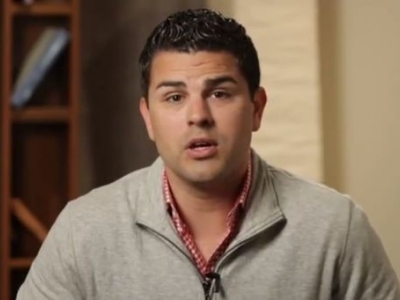
Book review: For the Love of Discipline
For the Love of Discipline explores a gospel-shaped response to tantrums and time-outs.
For the Love of Discipline: When the Gospel Meets Tantrums and Time-Outs by Sara Wallace
Sara Wallace is a home-schooling mother of five boys. So it was with respect and admiration that I sat down to read her book, For the Love of Discipline: When the Gospel Meets Tantrums and Time-Outs.
Wallace writes in an honest, personal style. She says: ‘I didn’t write this book because discipline comes naturally to me, or because my kids are models of obedience. I wrote it because my kid pushed your kid into the pool at swim lessons. I wrote it because last week I had to leave the grocery store early when my kids were wrestling in the aisles. And I wrote it because discipline seems exhausting and discouraging only when we leave out the most important ingredient: the gospel’ (p.7).
While our children are young, we have a window of opportunity to guide them with love. Wallace emphasises that discipline is not just about a change of behaviour, but a change of heart. When our children disobey, it gives us a chance to see what’s in their heart, and lead them to the cross of Jesus.
The first part of For the Love of Discipline presents a gospel-centred approach to discipline. The second part shows what this might look like in practice. This makes a great combination.
Wallace begins with a definition: ‘We often associate discipline solely with consequences—something we do to our kids when they disobey. If we stop there, we will miss the depth and beauty of God’s plan for discipline. The Greek word for discipline is “paideia“, which means “the whole training and educating of children, which relates to the cultivation of mind and morals”. Yes, discipline involves training and consequences, but that “cultivation“ in the definition above takes place in the rich soil of shepherding, nourishing, and cherishing our children’ (p. 10).
In keeping with this definition, For the Love of Discipline is largely a positive book. It doesn’t focus on consequences or punishments, but on how we can train and teach our children in daily life. As Wallace writes, ‘Discipline is not something we do to our kids, but something we do for them. It is a lifestyle. It doesn’t need its own category; it’s woven all throughout family life. But it doesn’t happen by accident’ (p. 11).
It may disappoint some readers to know that the book doesn’t even address the question of smacking or spanking. Wallace seems to occasionally use physical discipline, but does not provide a defence or discussion of the practice.
In Chapter 2, Wallace uses the truths of the gospel to explain the difference between punishment and discipline. On the cross, God punished sin once and for all—there is now no condemnation for those who trust in Jesus. But as our heavenly Father, God still disciplines us in love, for our good. Godly discipline doesn’t seek retribution, but a changed heart and a changed relationship.
Wallace then explains how the ‘fear of God’ impacts our approach to discipline. ‘When we forget to teach our kids to fear God, our discipline becomes man-centered. It says, “You should obey me because I am in charge. I am bigger, stronger, and smarter than you”. As daily disciplinarians, we get hung up on our authority. When we regularly point our kids to an awesome God, our discipline will naturally point them to his authority. The buck doesn’t stop with Mom and Dad. We are all accountable to someone so much greater. Our discipline channels the very love and authority of God, not our own pride and desire for power’ (p.30).
Chapter 5 provides some good advice for avoiding the extremes of being too strict or too lenient. Chapter 6 then looks at the place of our emotions. Wallace encourages parents to take the middle road of Spirit-led discipline: ‘While we can’t take for granted the importance of consistency, we also need to leave room for the Holy Spirit to guide us. Purely objective discipline says, “What does my discipline chart say?” Spirit-led discipline says, “What does my child’s heart need right now?” (p.41). This chapter finishes with some great tips for dealing with our own emotions, especially anger.
While Wallace discusses how the Holy Spirit can help parents to discipline, she doesn’t address how he might help children to obey. However, the Bible teaches that even children can experience the Spirit’s empowering. In Acts 2, Peter finishes his sermon with the words:
Repent and be baptised, every one of you, in the name of Jesus Christ for the forgiveness of your sins. And you will receive the gift of the Holy Spirit. The promise is for you and your children and for all who are far off – for all whom the Lord our God will call. (Acts 2:38–39)
In the Bible, we meet many children who are models of Spirit-filled faith and godliness.
This is symptomatic of a broader trend: most North American authors, like Wallace, do not consider their children to be Christians until they have made a clear profession of faith. Wallace claims that ‘we don’t necessarily know whether our children are Christians’ (p.18). Later, she writes, ‘We hold our kids to God’s standards—not because we assume they are saved, but because we are teaching them something about God and about themselves’ (p.46).
As an Anglican, I see things differently. Of course, we can’t guarantee that all of our children will take on our Christian faith as their own. But we can still consider them to be members of God’s family with us, until they make a conscious choice. In Israel, children were included in the covenant community: boys were circumcised, children were present at the reading of the Law (Deuteronomy 31:12–13) and children participated in Israel’s ceremonies and festivals (for example, in Exodus 12:25–27). In the New Testament, Paul calls the children of at least one believing parent ‘holy’—that is, members of God’s chosen people (1 Corinthians 7:14).
According to the Bible, obedience can’t be separated from identity: what we do flows from who we are (see Deuteronomy 6:20–24 or Ephesians 5:1–2). Our children can strive to behave like members of God’s family, because they are members of God’s family with us.
Our children share not only our membership in God’s covenant community, but also our sinful nature. In Chapter 7, Wallace makes the helpful distinction between requiring our children to obey and expecting that they always will. When our children disobey, we shouldn’t be surprised; we should be ready with a considered response.
Part 2 begins by emphasising the importance of structure and routine. Wallace describes how she organises her day, and which values she teaches her children at each point. I was inspired by Wallace’s intentionality, but her model could be difficult to follow for parents who go out to work or send their children to a normal school.
Wallace seems to be at home with her sons most days, while her husband is out at work. Consequently, she seems to do most of the day-to-day disciplining. I would have liked to hear more about how Sara and her husband work in partnership to discipline their sons. After all, fathers bear a particular responsibility for the discipline of children, even if the day-to-day implementation is done by both parents (see 1 Timothy 3:2–5; Ephesians 6:4).
The next few chapters provide wise advice on various topics: using our words effectively, managing fights between siblings, and responding to a toddler’s direct disobedience.
Next, Wallace turns to the issue of tantrums. She suggests a three-stage process: give the child some alone time, identify the cause, and teach appropriate responses. Wallace encourages parents to deal with inappropriate behaviour, but also to show grace in recognising possible causes like hunger or tiredness.
In conclusion, For the Love of Discipline makes an encouraging and compelling read for parents of younger children. This book will help you to step back and consider how the gospel might shape your approach to raising children.
For more articles from Growing Faith, subscribe to our monthly e-newsletter.
To hear about the latest books and resources from Youthworks Media, subscribe here.








